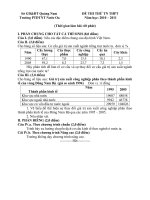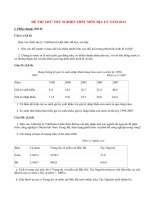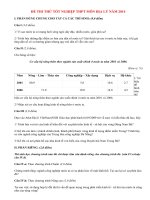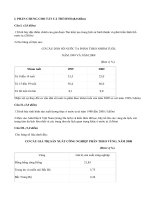Đề thi thử tốt nghiệp THPT tiếng Anh 2021 có đáp án số 24
Bạn đang xem bản rút gọn của tài liệu. Xem và tải ngay bản đầy đủ của tài liệu tại đây (125.33 KB, 8 trang )
<span class='text_page_counter'>(1)</span>ĐỀ THI THỬ THPTQG MÔN TIẾNG ANH NĂM 2021 CÓ ĐÁP ÁN Mark the letter A, B, C, or D on your answer sheet to indicate the word whose underlined part differs from the other three in pronunciation in each of the following questions. Question 1: A. looked B. laughed. C. widened. D. stopped. Question 2: A. still. C. begin. D. bride. B. chilly. Mark the letter A, B, C, or D on your answer sheet to indicate the word that differs from the other three in the position of primary stress in each of the following questions. Question 3: A. believe B. borrow. C. design. D. expect. Question 4. A. habitat B. pollution. C. construction. D. equipment. Mark the letter A, B, C, or D on your answer sheet to indicate the correct answer to each of the following questions. Question 5: The woman is really friendly, ______? A. was she. B. isn’t she. C. doesn’t she. D. did she. Question 6: Every night, the office ______ by the cleaning crew. A. is vacuumed. B. vacuumed. C. vacuumes. D. has vacuumed. Question 7: We borrowed the bikes ______ our uncle. A. on. B. in. C. at. D. from. Question 8: ______ we grow, the wiser we become. A. The older. B. Older. C. The oldest. D. Oldest. Question 9: She looked so beautiful in her ______ dress. A. white wonderful long. B. wonderful long white. C. white long wonderful. D. wonderful white long. Question 10: He saw the accident when he ______ home from work. A. drove. B. was driving. C. is driving. D. drives. Question 11: Many exam candidates lose marks simply ________ they do not read the questions properly. A. because of. B. because. C. in spite of. D. although. Question 12: She will send me the design of my new house ______. A. after she had finished it. B. while she was finishing it.
<span class='text_page_counter'>(2)</span> C. as soon as she has finished it. D. before she finished it. Question 13: ______ on the topic of the presentation, he started finding relevant information for it. A. Decided. B. Having decided. C. Being decided. D. To decide. Question 14: They had a ______ candlelit dinner last night and she accepted his proposal of marriage. A. romance. B. romantic. C. romantically. D. romanticize. Question 15: They ______ a big fortune when they were young, so they didn’t have to work hard. A. came into. B. went up. C. came across. D. went around. Question 16: The biggest fear is that humans might ______ control over robots. A. gain. B. keep. C. lose. D. take. Question 17: He had no prior ______ of the language before visiting the country. A. security. B. product. C. literature. D. knowledge. Question 18: There are no ______ differences between the two groups of students. A. suspicious. B. desperate. C. significant. D. consistent. Question 19: She was a minister with considerable influence in the ______ of power. A. corridors. B. cabinets. C. priorities. D. concepts. Mark the letter A, B, C, or D on your answer sheet to indicate the word(s)CLOSEST in meaning to the underlined word(s)in each of the following questions. Question 20: We generally like those whom we have benefited, if our services are suitably acknowledged. A. properly. B. wrongly. C. responsibly. D. normally. Question 21: Her parents are growing increasingly concerned by her erratic behaviour. A. answerable. B. angelic. C. anxious. D. Ancestral. Mark the letter A, B, C, or D on your answer sheet to indicate the word(s)OPPOSITE in meaning to the underlined word(s)in each of the following questions. Question 22: This product is hazardous to the eyes and should be kept out of reach of children. A. dangerous. B. useful. C. safe. D. Interesting. Question 23: The captain ordered the soldiers to gather on the double even though they were sleeping..
<span class='text_page_counter'>(3)</span> A. willingly. B. immediately. C. slowly. D. Intensively. Mark the letter A, B, C, or D on your answer sheet to indicate the option that best completes each of the following exchanges. Question 24: A customer is talking to a shop assistant about the sweater he has chosen. - Customer: “That's nice. Could I try it on?”- Shop assistant: “______” A. Certainly, the changing rooms are over there. B. Oh, sorry. We don’t have this room. C. That’s right. You must try it before buying. D. Yes, of course, but you must pay the bill first. Question 25: Laura and Tom are talking about their school curriculum. -Laura: ''I think Art should be a compulsory subject. '' - Tom : ''______. Art helps develop creativity. '' A. I quite agree. B. You must be kidding. C. I'm of the opposite opinion. D. I don't think that's a good idea. Read the following passage and mark the letter A, B, C, or D on your answer sheet to indicate the correct word or phrase that best fits each of the numbered blanks from 26 to 30. Do you ever wish you were more optimistic, someone (26)______ always expected to be successful? Having someone around who always fears the worst isn't really a lot of enjoyment - we all know someone who sees a single cloud on a sunny day and says, “It looks like rain.” but if you catch yourself thinking such things, it's important to do something about it. You can change your view of life, (27)______ psychologist. It only takes a little effort, and you'll find life more rewarding as a result. Optimism, they say, is partly about self-respect and confidence but it's also a more positive way of looking at life and all it has to (28)______. Optimists are more likely to start new projects and are generally more prepared to take risks. Upbringing is obviously very important in forming your attitude to the world. Some people are brought up to depend too much on (29)______ and grow up forever blaming other people when anything goes wrong. Most optimists, on the other hand, have been brought up not to suppose (30)______ as the end of the world - they just get on with their lives. Question 26: A. who. B. whose. C. whom. D. which.
<span class='text_page_counter'>(4)</span> Question 27: A. otherwise. B. according to. C. therefore. D. however. Question 28: A. apply. B. propose. C. suggest. D. offer. Question 29: A. others. B. ones. C. another. D. all. C. failure. D. direction. Question 30: A. income B. freedom. Read the following passage and mark the letter A, B, C, or D on your answer sheet to indicate the correct answer to each of the questions from 31 to 35. Each year, the Academy Awards, better known as the “Oscars”, celebrate the best films and documentaries with categories ranging from acting, directing and screenwriting, to costumes and special effects. This year, 9-year-old Quvenzhané Wallis joins the list of kids who have taken the movie business by storm , as she competes for the best actress award for her role as “Hushpuppy” in the film “Beasts of the Southern Wild”. The Academy of Motion Picture Arts and Sciences is made up of filmmakers in all fields. The group ranks their favourites in each category. Oftentimes Oscar recognition can take many years, but for some lucky and talented individuals that honour comes early in life. Newcomer Quvenzhané Wallis (pronounced Kwe-VEN-zhah-nay)portrayed “Hushpuppy, ” a young girl fighting to survive in a poor Mississippi Delta community prone to devastating flooding. In the film, Wallis learns to find food in the wilderness, escapes a homeless shelter and deals with the death of her father. She will be the youngest ever nominee in the best actress category at nine years old. Born in Houma, LA. , Quvenzhané was just five years old when she auditioned for Beasts of the Southern Wild. Since auditions for the role of Hushpuppy were only open to 6-9-year olds, Quvenzhané’s mother lied on the initial paperwork to allow her daughter to audition. When director Benh Zeitlin saw her audition however, he immediately recognized her as the best pick for this strong and independent young character. Question 31: Which could be the best title of the passage? A. Young Actors Achieve Big for the Oscars B. Little Lady Nominees for the Oscars C. Youngest Ever Nominee for the Oscars D. A Young Actress makes it to the Oscars Question 32: According to the passage, the Academy Awards celebrate ______. A. musical films. B. documentaries. C. news. Question 33: The word “competes” in paragraph 1 mostly means _____.. D. cartoons.
<span class='text_page_counter'>(5)</span> A. contests. B. provides. C. includes. D. explore. Question 34: The phrase “that honour ” in paragraph 2 refers to ______. A. lucky and talented individuals C. favourites. B. Oscars recognition. D. Award. Question 35: Which of the following is TRUE about Quvenzhané Wallis as stated in the passage? A. She is a young girl fighting to survive in a poor Mississippi Delta community. B. She has won the best actress Oscars award for her role in “Hushpuppy”. C. She escapes a homeless shelter and deals with the death of her father. D. She is the youngest ever nominee in the best actress category for the Oscars. Read the following passage and mark the letter A, B, C, or D on your answer sheet to indicate the correct answer to each of the questions from 36 to 42. Even before the turn of the century, movies began to develop in two major directions: the realistic and the formalistic. Realism and formalism are merely general, rather than absolute, terms. When used to suggest a tendency toward either polarity, such labels can be helpful, but in the end, they are still just labels. Few films are exclusively formalist in style, and fewer yet are completely realist. There is also an important difference between realism and reality, although this distinction is often forgotten. Realism is a particular style, whereas physical reality is the source of all the raw materials of film, both realistic andformalistic. Virtually all movie directors go to the photographable world for their subject matter, but what they do with this material - how they shape and manipulate it determines their stylistic emphasis. Generally speaking, realistic films attempt to reproduce the surface of concrete reality with a minimum of distortion. In photographing objects and events, the filmmaker tries to suggest the copiousness of life itself. Both realist and formalist film directors must select (and hence emphasize)certain details from the chaotic sprawl of reality. But the element of selectivity in realistic films is less obvious. Realists, in short, try to preserve the illusion that their film world is unmanipulated, an objective mirror of the actual world. Formalists, on the other hand, make no such pretence. They deliberately stylize and distort their raw materials so that only the very naive would mistake a manipulated image of an object or event for the real thing. We rarely notice the style in a realistic movie; the artist tends to be self-effacing. Some.
<span class='text_page_counter'>(6)</span> filmmakers are more concerned with what is being shown than how it is manipulated. The camera is used conservatively. It is essentially a recording mechanism that reproduces the surface of tangible objects with as little commentary as possible. A high premium is placed on simplicity, spontaneity, and directness. This is not to suggest that these movies lack artistry, however, for at its best the realistic cinema specializes in art that conceals art. Question 36: What does the article mainly discuss? A. Acting styles. B. Film plots. C. Styles of filmmaking D. Filmmaking 100 years ago Question 37: Which statement is TRUE, according to the passage? A. Realism and formalism are outdated terms. B. Most films are neither exclusively realistic nor formalistic. C. Realistic films are more popular than formalistic ones. D. Formalistic films are less artistic than realistic ones. Question 38: According to the pasage, who is primarily responsible for the style of a film? A. The director. B. The actors. C. The producer. D. The camera operator. Question 39: The word "preserve" in paragraph 3 is closest in meaning to ______. A. encourage. B. maintain. C. reflect. D. attain. Question 40: The word "They" in paragraph 3 refers to ______. A. films. B. realists. C. formalists. D. raw materials. Question 41: According to paragraph 3, how can one recognize the formalist style? A. It uses familiar images.. B. It is very impersonal.. C. It mirrors the actual world.. D. It obviously manipulates images.. Question 42: The word "tangible" in paragraph 4 is closest in meaning to ______. A. concrete. B. complex. C. various. D. Comprehensible. Mark the letter A, B, C, or D on your answer sheet to indicate the underlined part that needs correction in each of the following questions. Question 43: Nearly 230, 000 people die in 2004 Indian Ocean earthquake and tsunami, A. B. making it one of the deadliest disasters in modern history. C. D. Question 44: When children go to bed on Christmas Eve, they hang up a pillow case or a.
<span class='text_page_counter'>(7)</span> A. B. C. sack for its presents. D Question 45: Televisions are now an everyday feature of most households in the United A. B. States, and television viewing is the number of one leisured activity. C. D. Mark the letter A, B, C, or D on your answer sheet to indicate the sentence that is closest in meaning to each of the following questions. Question 46: They last travelled to school by bike two years ago. A. They have travelled to school by bike for two years. B. They have travelled to school by bike two years ago. C. They haven't travelled to school by bike for two years. D. They haven't travelled to school by bike two years ago. Question 47: “Would you like to go out for dinner tonight,” Tom said to Linda. A. Tom advised Linda to go out for dinner that night. B. Tom refused Linda to go out for dinner that night. C. Tom invited Linda to go out for dinner that night. D. Tom ordered Linda to go out for dinner that night. Question 48: It isn’t necessary for you to write the essay now. A. You don’t have to write the essay now.. B. You should write the essay now.. C. You mustn’t write the essay now.. D. You must write the essay now.. Mark the letter A, B, C, or D on your answer sheet to indicate the sentence that best combines each pair of sentences in the following questions. Question 49: You don’t understand the lesson. You keep talking in the class. A. Unless you paid attention in the class, you won't understand the lesson. B. I wish you pay attention in the class, you will understand the lesson. C. As long as you didn’t pay attention in the class, you would understand the lesson. D. If only you paid attention in the class, you would understand the lesson. Question 50: My aunt was too weak. She couldn't take part in the marathon last week. A. So weak was my aunt that she couldn’t take part in the marathon last week. B. Such weak was my aunt that she couldn’t take part in the marathon last week..
<span class='text_page_counter'>(8)</span> C. Had my aunt been too weak, she couldn’t take part in the marathon last week. D. But for my aunt's weakness, she couldn't take part in the marathon last week. ĐÁP ÁN 1 - C; 2 - D; 3 - B; 4 - A; 5 - B; 6 - A; 7 - D; 8 - A; 9 - B; 10 - B; 11 - B; 12 - C; 13 - B; 14 - B; 15 - A; 16 - C; 17 - D; 18 - C; 19 - A; 20 - A; 21 - C; 22 - C; 23 - C; 24 - A; 25 - A; 26 - A; 27 - B; 28 - D; 29 - A; 30 - C; 31 - C; 32 - B; 33 - A; 34 - B; 35 - D; 36 - C; 37 - B; 38 - A; 39 - B; 40 - C; 41 - D; 42 - A; 43 - A; 44 - D; 45 - D; 46 - C; 47 - C; 48 - A; 49 - D; 50 - A; Mời các bạn tham khảo các bài tiếp theo tại: gia.
<span class='text_page_counter'>(9)</span>









